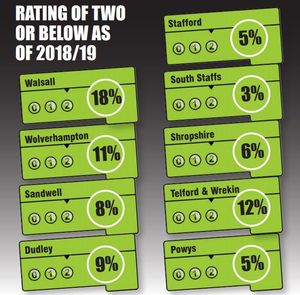Revealed: Hundreds of food firms failing hygiene checks
Hundreds of food businesses in Shropshire and Mid Wales are failing to meet hygiene standards, it has been revealed.
The latest figures from the Food Hygiene Standards Agency include takeaways and restaurants, as well as manufacturers and distributors.
They show that hundreds of food businesses across Shropshire, Telford & Wrekin, and Powys have been told they need to make improvements.
Those businesses scored two or below on the five point scale set up to rank the hygiene of food providers.
For Telford & Wrekin 12 per cent of the borough’s 1,394 food businesses were judged to be two or below – a total of 161 premises during 2018/19.

The percentage was considerably lower in Shropshire, where six per cent fell within the same category. It means that 206 of the area’s 3,589 establishments have been told to improve.
For Powys the percentage fell by a point to five per cent of those assessed. In total 117 of the county’s 2,586 premises found themselves being told to get better by the authorities.
The rate across England, Wales and Northern Ireland , was nine per cent, but not all establishments will have been inspected during the course of the year.
Businesses are, by law, required to display their food hygiene ranking at their entrance, allowing customers the information they need before making a purchase.
Risk ranking
Firms are also given a risk ranking to determine how often they need to be assessed, based on factors such as the type of food being handled or the number of consumers potentially at risk.
As of March, there were five Telford and Wrekin businesses placed in the most high-risk category – five of which had a hygiene rating of less than three.
For Shropshire it was eight – six of which had a hygiene rating of less than three, and in Powys there were 12, with 11 seeing their rating falling below three.
Court action has also been taken against a number of premises across the county with 13 in Telford & Wrekin subject to some kind of formal action from the council or courts.
For Shropshire the number was 11, and in Powys there was a huge jump with 31 premises sanctioned.
Across all three areas written warnings were issued to 1,168 businesses – 484 in Shropshire, 521 in Telford & Wrekin, and 163 in Powys.
A host of reasons have been given for the actions. As a result there were five voluntary closures in Powys, one in Shropshire, and three in Telford & Wrekin.
Enforcement
Telford officials also issued nine hygiene improvement notices, and one emergency prohibition notice – immediately closing a business because of imminent risk to the public.
In Shropshire there were three seizures of food not fit for consumption and seven hygiene improvement notices issued. For Powys there were four cautions, five seizures of food not fit for consumption, and eight hygiene improvement notices.
Across England, Wales and Northern Ireland, council inspectors took enforcement actions, including informal written warnings, against almost 160,000 establishments.
The proportion of businesses with a hygiene rating of at least three increased slightly, rising by 0.5 percentage points compared to the previous year.
In total, councils carried out 86.3 per cent of all the interventions due to be completed during the course of the year, which can include activities such as surveillance, sampling visits or full inspections – up from 85.1 per cent the previous year.
Shropshire Council estimates that it employs the equivalent of 6.7 full-time members of staff who are responsible for managing food hygiene standards. That’s 1.6 employees for every 1,000 businesses, lower than the national average of 2.6.
Telford & Wrekin Council’s estimate is 3.4 full-time members of staff – 2.4 employees for every 1,000 businesses.
Powys County Council has 8.6 full-time workers – 3.2 employees per 1,000 businesses.
Maria Jennings, director of regulatory compliance of the Food Standards Agency, said: “Local authorities are there to ensure that food businesses produce food that is safe and what it says it is.
“One of the FSA’s roles is to have oversight and assurance about their performance.
“It is good to see an increase in the total percentage of planned hygiene interventions that local authorities are carrying out and an increase in premises with standards equivalent to a food hygiene rating of three, four and five.”



